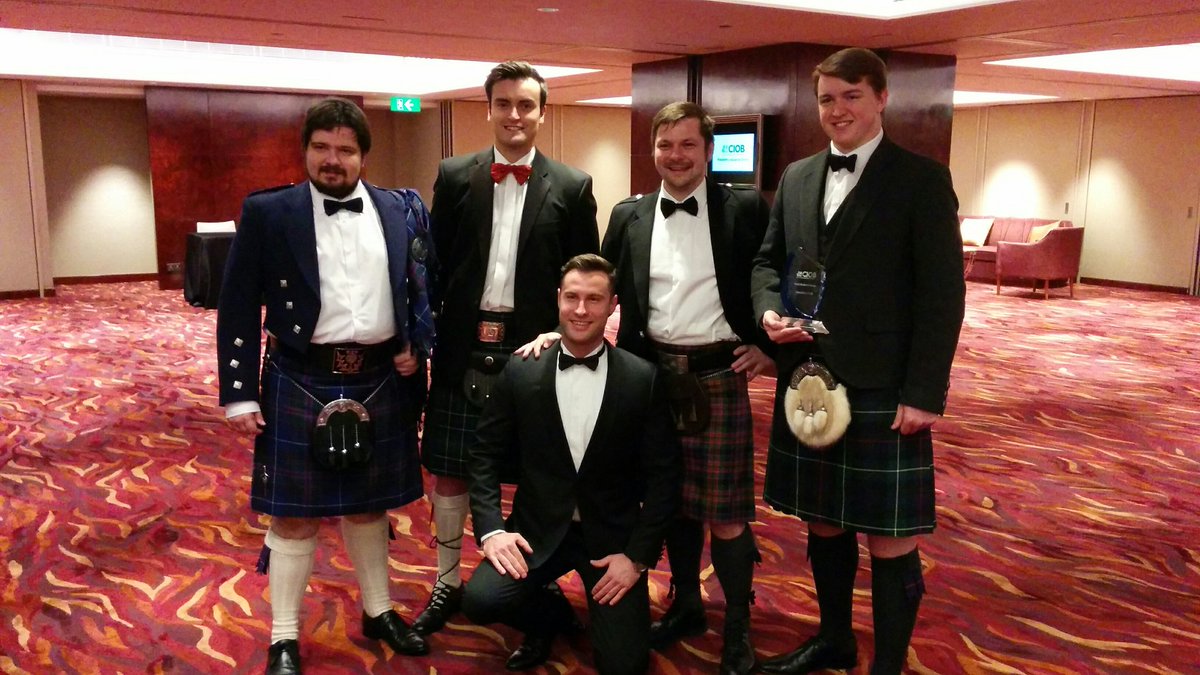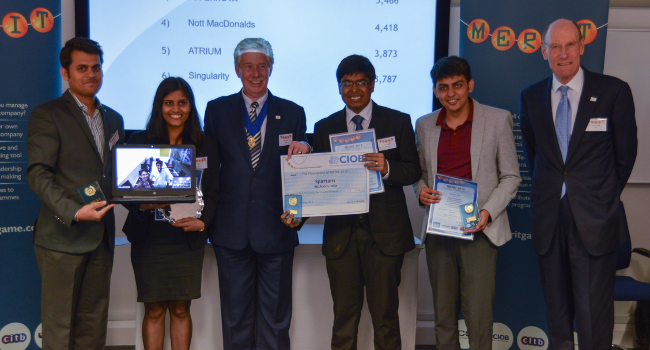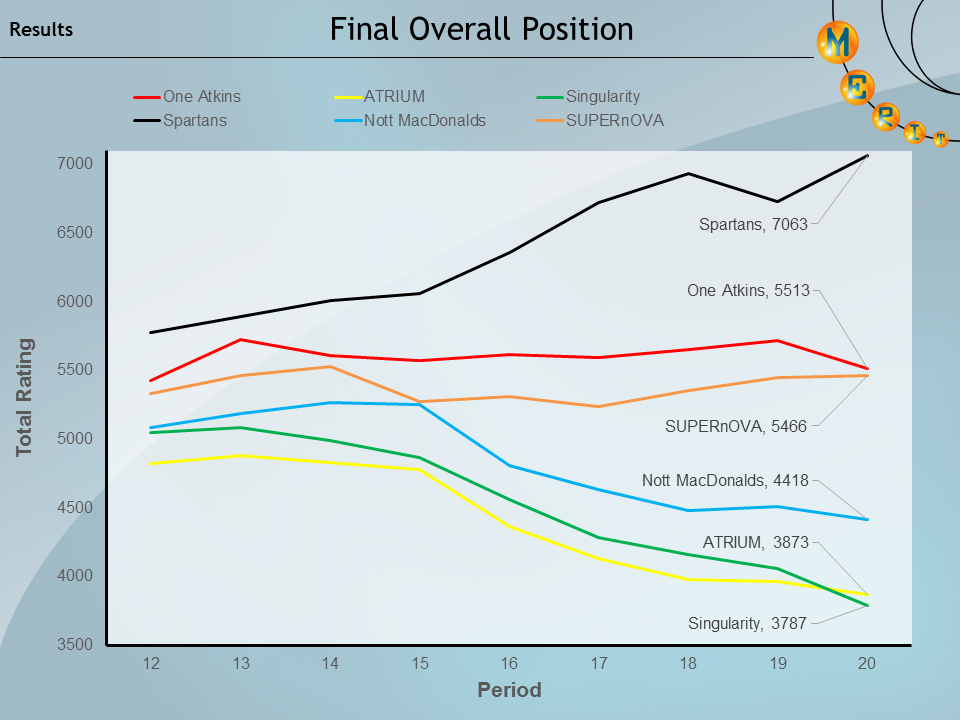- Details
- Hits: 5365
 We are pleased to announce that the Timetable for MERIT 2017 has been finalised.
We are pleased to announce that the Timetable for MERIT 2017 has been finalised.
MERIT 2017 has been set up to model a construction industry operating in an economy emerging from a recession with up to date bank interest rates and charges and current corporation tax. Learning to survive as a construction business in tough market conditions with fierce competition is the knowledge currently needed by our industry executives.
After completing eight rounds simulating two years of trading the top six teams will be invited to Loughborough University to experience a further two years of simulated trading in the MERIT 2017 final, the winning team will be presented with the ICE’s Silver Salver, £5000 cash prize and named the 2017 MERIT Champion.
Registration
- 10 Oct 2016 - 17 Feb 2017
Trialling
- Jan 2017 - 22 Feb 2017
Submissions
- Round 1 - Wednesday 22 Feb 2017
- Round 2 - Wednesday 01 Mar 2017
- Round 3 - Wednesday 08 Mar 2017
- Round 4 - Wednesday 15 Mar 2017
- Round 5 - Wednesday 22 Mar 2017
- Round 6 - Wednesday 29 Mar 2017
- Round 7 - Wednesday 05 Apr 2017
- Round 8 - Wednesday 12 Apr 2017
Final at Loughborough University
- 11 & 12 May 2017
- Details
- Hits: 5625

The CIOB Global Student 2016 Final has concluded, and Cali Construction from Glasgow Caledonian University have been crowned Champions
- Details
- Hits: 6524
 The 'Spartans' team from WS Atkins India led throughout the final stages of the MERIT management game at Loughborough University in May, to receive the trophy from ICE President Sir John Armitt. Indeed this year was something of a triumph for Atkins' overseas operations, with a team from the firm's Hong Kong office as runner up, and two other Atkins India teams among the six finalists.
The 'Spartans' team from WS Atkins India led throughout the final stages of the MERIT management game at Loughborough University in May, to receive the trophy from ICE President Sir John Armitt. Indeed this year was something of a triumph for Atkins' overseas operations, with a team from the firm's Hong Kong office as runner up, and two other Atkins India teams among the six finalists.
MERIT – or management, enterprise, risk, innovation and teamwork – is a web-based computer simulation which allows young professionals, working in groups and acting as a board of directors and managers, to run their own construction company. The early rounds are played against a computer, with just the top six of (this year) 117 entries making the finals, where they compete against each other.
 Spartans' Akrist Pandey attributed his team's success to tactics including finishing jobs early so as to improve client relationships, while at the same time seeking out different clients to provide a broader client base. But success was also down to sheer hard work: since January the team had been working on MERIT for two or three hours every night, plus some mornings and weekends. Much of the work was done on line, as the team was spread over two Atkins offices – in Bengaluru and Gurgaon near Delhi. 'We were really enjoying it' said Pandey, 'especially after the first two rounds when we realised we were doing well!'
Spartans' Akrist Pandey attributed his team's success to tactics including finishing jobs early so as to improve client relationships, while at the same time seeking out different clients to provide a broader client base. But success was also down to sheer hard work: since January the team had been working on MERIT for two or three hours every night, plus some mornings and weekends. Much of the work was done on line, as the team was spread over two Atkins offices – in Bengaluru and Gurgaon near Delhi. 'We were really enjoying it' said Pandey, 'especially after the first two rounds when we realised we were doing well!'
The Indian success may well reflect what is going on in the real world, believes Atkins' global design centre interface manager Julien Green who was proudly accompanying his teams to Loughborough. The firm has more than 1100 staff in India, enabling Atkins to resource projects in the UK and the rest of the world which it would not be able to take on without this additional support. Education in India is more than a match for the UK, says Green, and staff motivation is particularly high. 'And our Indian offices have outperformed our UK offices on a range of measures – innovation, delivery on time, quality and budget, right-first-time.' Inevitable difficulties, particularly around client interface and differences in culture, are addressed by regular exchange visits: Atkins invested nearly £20k in bringing its teams to the finals, but the trip also included visits to several of the firm's UK offices.
Just pipped into third place by 'One Atkins' was 'SUPERnOVA' from Arup's Hong Kong office, with the only UK team to reach the final – Nott MacDonalds from Mott MacDonald's Sheffield office – in fourth.
On presenting the ICE silver salver to the winners, Armitt also presented two challenges to the participants for their future careers. The first was to recognise that central to the success of major projects was politics and money: 'There are always technical issues, but there are also politics and funding. We as engineers don't like doing this. But we have to articulate the arguments. It's a challenge for the profession, we must get out and join the debate.'
His second challenge was to stimulate innovation, where he believed construction has fallen far behind industries such as biochemistry, aerospace or telecoms. Who is going to make the breakthrough in materials technology, or how to build better houses more efficiently?, he asked. 'Your success here has demonstrated you have the capabilities to tackle these challenges. With people like you coming into it, this industry has a great future.'
Also attending the finals were Alan Crane, past president of the Chartered Institute of Building which added a cash prize to the winner (check?), and Mick Guy of the Construction Industry Training Board presented a cheque for the sponsors award , which (unsurprisingly) went to Atkins India.









